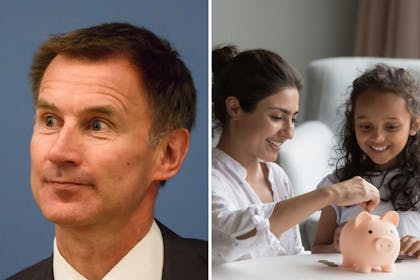Will 'unfair' Child Benefit charges be scrapped in the spring Budget?

With the Spring Budget coming in under two weeks, there have been calls to scrap the 'unfair' charge that sees families pay back their Child Benefit
The Spring Budget will be held in a matter of weeks, and families eagerly await the Chancellor's announcement.
From a reduction in tax to an extension of the Household Support Fund, many potential announcements could be made in Jeremy Hunt's speech to help families.
One thing many parents are hoping to be announced is for the High Income Child Benefit charge (HICBC) to be scrapped, due to its 'unfair' nature.
- Will the Household Support Fund be extended in the spring Budget
- What can we expect to be announced in the spring budget?
- M&S' £40 denim midi dress shoppers say is 'perfect' for spring
- What to do if you haven't received your £299 Cost of Living payment
- Change to how much Universal Credit you'll get coming within weeks
'If it is affordable I will do so'
Martin Lewis asked viewers of ITV's Martin Lewis Money Show to send in their biggest money worries and he found that the High Income Child Benefit Charge (HICBC) was viewers's biggest concern 'by a mile'.
Currently, parents have to pay this charge if they claim child benefit and earn over £50,000 individually.
Martin has since been campaigning for Mr Hunt to announce the government will get rid of the charge in the Spring Budget, which is held on 6 March.
Martin spoke to the Chancellor about the feedback he's had from viewers to which Mr Hunt replied: 'We look at those thresholds every year in budgets and we will continue to do that.
'There is a very big distortion in the marginal rate of tax that people earn and I fully accept there is an unfairness with what happens with dual income families.
'All I will say is this is one of many distortions in our overcomplicated tax system that I look at. There are lots of things I would like to change. If it is affordable I will do so but it is too early to tell at this stage.'
What is the HICBC?
The HICBC is a tax that you have to pay if you claim Child Benefit and make over a certain income.
Introduced in 2013, the tax charge means you must pay back 1% of your Child Benefit for every £100 over £50,000 you earn, meaning if you hit £60,000, you have to pay back all of your Child Benefit via a self-assessment.
This rule only affects parents if one earns over £50,000, which has meant which has caused single-income families to find this rule 'unfair'.
For example, parents can earn a joint income of £98,000 (if they each earn £49,000), and not face the charge, a single parent would be subject to the charge once they earn over £50,000.
The charge is also considered out of date considering inflation means a £50,000 salary 11 years ago is very different to a £50,000 salary today.
What is Child Benefit?
Child Benefit is a payment that you can claim if you’re responsible for a child under the age of 16 (or under 20 if they're in full-time education or training).
To qualify for Child Benefit, you don't have to be the child's parent but you must either live with the child or be paying at least the same amount as Child Benefit towards looking after them. This includes food costs, clothes, and pocket money.
Only one person can receive Child Benefit per child. Currently, there is no limit to how many children parents can claim the benefit for.
How much can I get?
At the moment, parents get:
- £24 per week for their first child
- £15.90 for each additional child.
In April 2024 this will increase to:
- £25.60 per week for the first child
- £16.95 per week per additional child
Here's exactly how much Child Benefit you'll get from April 2024, depending on how many children you're claiming for:
- One child: £25.60 a week, or £1,331.20 a year
- Two children: £42.55 a week, or £2,212.60 a year
- Three children: £59.50 a week, or £3,094 a year
- Four children: £76.45 a week, or £3,975.40 a year
- Five children: £93.40 a week, or £4,856.80 a year
What is the Spring Budget?
The Spring Budget follows the Autumn Statement, where financial plans are put forward by the Chancellor for the upcoming tax year to set out the government's spending plans.
In his 2023 Autumn Statement, Mr Hunt announced an increase to the National Living Wage and to all benefits payments, such as Universal Credit and Child Benefit.
In his Spring Budget, Mr Hunt will provide an update on these pledges, and how the government will be proceeding with them for the year as well as any new financial plans.
Any other changes I should know about?
There aren't any confirmed changes as of yet, however there are calls for Mr Hunt to extend the Household Support Fund (HSF).
This is a scheme funded by the DWP which is due to close on 31 March. The Fund has supplied local councils with money that could be spent on their residents, amid the cost of living crisis.
When asked about the HSF being extended, a spokesperson for the government department told Netmums: 'We continue to keep all existing programmes and cost-of-living measures under review.
'People in England are encouraged to speak to their local council about the help available in their area.'
There is a;sp speculation around the scrapping of stamp duty and reduction of 'beer tax', among other proposed changes.
Related stories
Martin Lewis shares tip that could bag you £200 free cash








